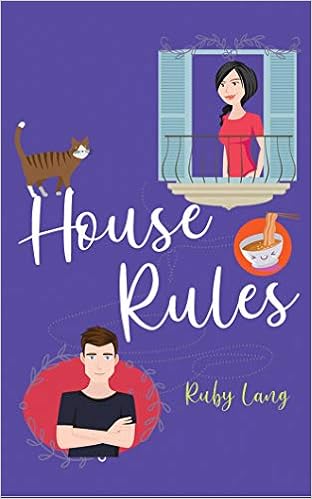Lana has returned to New York after years away, hoping to pursue restaurant work after spending oodles of time learning to make noodles. (You see, I have done a little wordplay there.) Meanwhile, her ex-husband Simon is planning to leave behind his inherited, rent-controlled, teensy-weensy apartment in favor of something new. When they cross paths for the first time in years, they must unwillingly admit that splitting the rent on a beautiful railroad-style apartment in Harlem makes pretty good sense. And moving in together leads them to face the things about them that have changed, and the things that have stayed the same.

As you hopefully have not yet tired of hearing me say, Ruby Lang’s books always stand out for their warmth, humor, and tenderness toward their characters, and House Rules is no exception. In the short space a novella affords, Lang makes her characters real humans trying to muddle along and figure things out as best they can. And sometimes she gives them the grace of being mistaken, as when Simon’s sister confronts him for acting like her life as a mother and wife is somehow less important and interesting than her pre-marriage choices. I continue to adore Lang’s knack for writing families where mutual love is never a perfect guard against prickliness and misunderstanding.
House Rules is a second chance romance that honors the reasons Simon and Lana didn’t work out the first time — no wicked mother hiding a year’s worth of letters in this book! — but also gives weight to the true and abiding affection they still have for one another.
“And you think this — us — is a good idea?”
“No, I don’t.”
He flinched slightly. But at the same time, he felt a little surprised. Lana of seventeen years ago had not been so blunt…. “How do you know I won’t try to steal this place from under you?”
“You wouldn’t do that to me. Because you’re honest, even kind of noble in your own way, Simon. I trust you. And that’s why I ended up thinking of you. Not that you weren’t in my mind before. But that’s why I supposed I could share a space with you.”
It’s exactly this honesty that makes the premise of House Rules work. In another author’s hands it could have felt extremely tropey (which I would have loved in a different way), but Lang makes it seem plausible in the physical landscape of New York housing hell and the emotional landscape of these two adults.
And they are adults. As the “Lana of seventeen years ago” line suggests, this isn’t a romance between people in their twenties. They’re coming to this relationship after years of living on the earth and discovering what they want and who they are, and that’s notable in how they interact with each other. When they look back on their marriage, they’re able to see each other more clearly in the light of hindsight, which in turn helps ease their paths back to each other. I also loved that Lang engages with the fact of their bodies: Simon and Lana experienced the regular aches and wonkiness that come with getting older, and Lana also battles horrific cramps and possible infertility as a result of her endometriosis.
(Sidebar, I am always happy when someone in a romance novel has a period. Periods! A lot of people have them!)
One curious side effect to all this emotional realism, which I find genuinely lovely and moving, is that the HEA feels rather equivocal. Knowing, as we do, that Simon and Lana broke up once before, and that Lana, at least, is now on the verge of major career changes, it’s hard to leave the book without a question in mind about whether they’re going to make it work in the long term. House Rules never lets the reader lose sight of the fact that relationships sometimes just don’t work out, not because of any huge nefariousness or failure on either side, but simply because life brought too much pressure to bear on fragile points. This is deeply true, and it lends legitimacy to Simon and Lana’s choice to get back together, but it also made me uncertain about the future. The result was a romance on the melancholy end of the romance spectrum, despite and because of its maturity, grace, and emotional truth.
If you’re interested in more about this book, check out reviews at Smart Bitches, Trashy Books and Let’s Fox About It!
Note: I received an e-ARC of this book from the publisher for review consideration. This has not impacted my review.